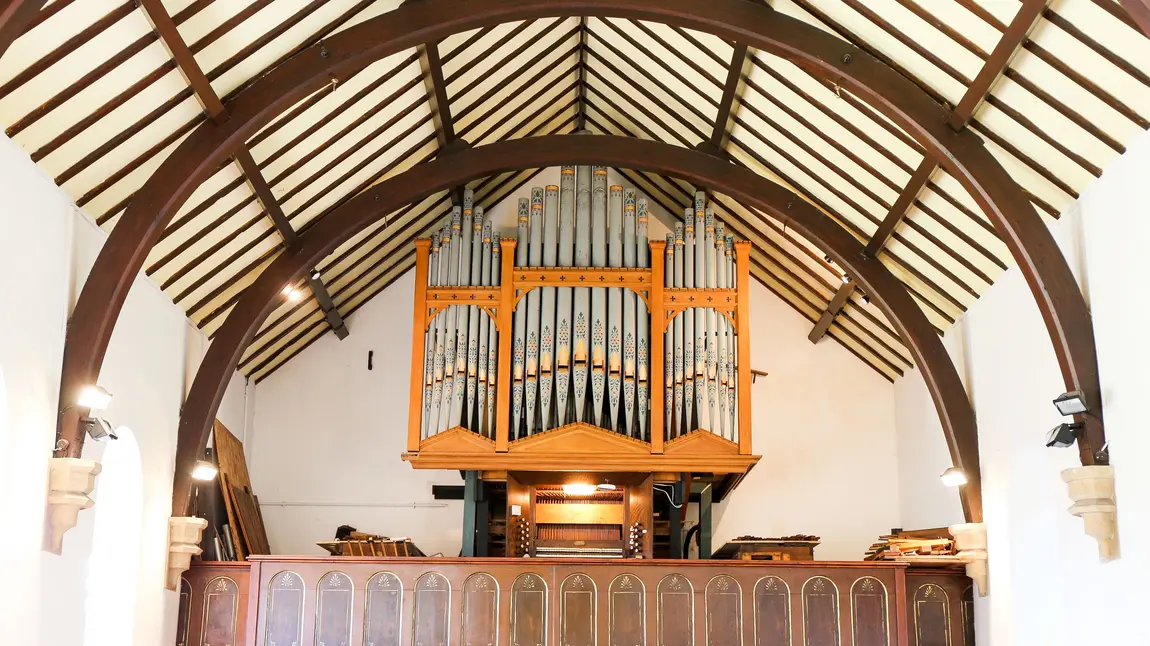HLF grant of £201,000 for Horsley Organ Restoration Group

This grant will ensure that their much loved pipe organ can now be restored to its original state.
H.J. Nelson and Company of Durham, which designed and constructed it, was responsible for the construction of many organs in the North East during the late 19th and early 20th centuries. But very few of these instruments still survive and even fewer are in excellent, playable condition.
Restoring this organ gives a wonderful opportunity to save this instrument and celebrate the traditions and history of our North-Eastern musical heritage.
Horsley’s pipe organ began life in 1907 at the Hill Crest Primitive Methodist Church at Tow Law, Co. Durham, funded by the generous donations of that mining community and by one of the first Carnegie grants. Dwindling congregations meant that the organ was then moved to a new home down the road in the Primitive Wesleyan Chapel in Tow Law. There it was played from 1964 onwards, until sadly, that chapel also had to close its doors in 1994.
[quote=Ivor Crowther, Head of HLF North East]“We’re delighted to support this project to make vital repairs to Holy Trinity’s organ, share its century old story and ensure the local community will benefit from this wonderful example of the North East’s musical heritage.”[/quote]
In the 1990s the Anglican congregation of Holy Trinity, Horsley, was desperate to find a durable musical instrument. Yet again, mice had wrought havoc with the keys and wires of their latest electronic keyboard, another fatality in a long line of harmoniums and keyboards which the resident church mice had found quite tasty! By chance, Horsley’s organist learned that Tow Law’s organ was destined for the scrapyard unless another home could be found for it. This seemed like the ideal solution for Holy Trinity Church. The remaining Wesleyan congregation in Tow Law were delighted to know that their pipe organ had found a good home, albeit at the upper end of rural Northumberland, and so commenced a true ecumenical fusion of Wesleyan and Anglican musical traditions in one Nelson’s pipe organ.
Dr Ian Roberts, Holy Trinity’s churchwarden, said: “Dismantling the instrument, meticulously labelling each part and transporting it up the A68 was a huge job for many helpers. It wouldn’t have been possible without local teamwork, help from the army and the loan of a lorry from Otterburn Camp. Local people in our parish raised funds to build a gallery at the back of our church to house it safely from marauding mice!”
However, despite enthusiastic attempts to rebuild it, the organ had suffered a lot of damage during the years since it was built in 1907. It needed professional restoration. The Horsley Organ Restoration Group was formed and a HLF grant was applied for and awarded in 2014 to develop restoration plans. In June of this year, the Group then applied for a full HLF grant of £210,000 and are delighted to have been successful. Thanks to the wonderful support from HLF, the organ will be now restored by Forth Pipe Organs Ltd in Rosyth, the same firm which did an excellent restoration job of the McEwan Hall organ in Edinburgh University.
Ivor Crowther, Head of HLF North East, said: “Thanks to money raised by National Lottery players we’re delighted to support this project to make vital repairs to Holy Trinity’s organ, share its century old story and ensure the local community will benefit from this wonderful example of the North East’s musical heritage.”
The organ has now been taken away to the Rosyth workshop where essential repairs and conservation work will be carried out, restoring both the sound and the visual appearance of the organ. Several trips are planned to Rosyth this coming year, so that anyone interested will be able to see various stages of the restoration. Community musical events, exhibitions and talks are planned during 2016 to keep people abreast of progress and will include significant contributions from volunteer musicians from Redesdale and North Tynedale. Following restoration, a series of recitals are planned, featuring well-known organists and choirs. The opening recitals will include a newly commissioned piece for organ and saxophone, and a special song for the children of the local schools. There has been great interest from local schools in a unique educational programme beginning in the autumn term of 2016. This will explore aspects of music, art, literature, design and technology with reference to an organ and how it works, all specially designed to tie in with the National Curriculum.
The restoration work in the church and at the organ builder’s workshop can be followed via a dedicated website which will go live in December 2015, giving the history of the organ and the steps to restore it, accompanied by a picture gallery and explanatory film clips from the Rosyth workshop. This should be of great interest to everyone interested in the project. There will be opportunity to ask questions and hear organ music as well.
As the whole project progresses, a film record is being kept. A DVD of the project will be produced at the end of the project and distributed free to the local community, as a tribute for all the work they have invested in saving this historical organ for posterity.
Explaining the importance of HLF support, the church organist Dr Jonathan West, said: “We are all working hard to ensure the success of this project and it’s great to know we’re a step closer to preserving our unique organ for another century at least.”
Further information
Dr Ian Roberts, Horsley Organ Restoration Group, on tel: 01830 520342 or via email: redewater.view@googlemail.com